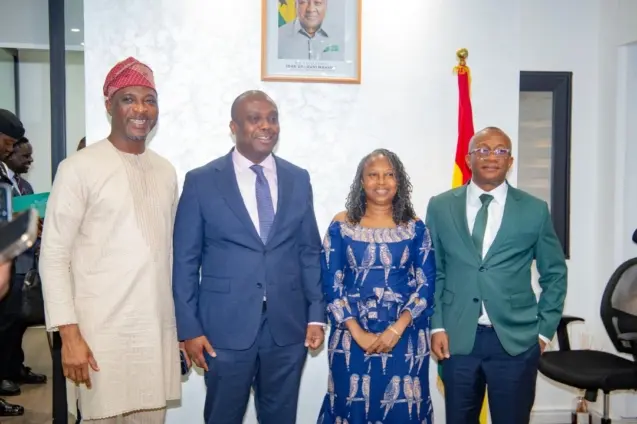Accra, Ghana – The Bank of Ghana (BoG) has embarked on a comprehensive review of its **monetary policy framework**, a move signaling potential shifts in how the central bank manages the nation’s economy. This initiative, spearheaded by Governor Dr. Johnson Asiama, centers on a transition from the Cash Reserve Ratio to a more dynamic approach utilizing Open Market Operations. The implications of this policy shift are broad, affecting everything from the liquidity of financial institutions to the availability of credit for businesses and consumers alike. This analysis will explore the objectives driving this review, the potential impacts on Ghana’s economic stability, and what it means for the future of financial management in the country.
The review comes at a crucial time for Ghana, as the central bank navigates a complex economic landscape. The decisions made during this review process will have a lasting impact on the nation’s financial health and its ability to foster sustainable growth.
Transitioning to Open Market Operations
A key aspect of the Bank of Ghana’s review is the planned shift away from a heavy reliance on the unremunerated Cash Reserve Ratio (CRR). For years, the CRR has been a central tool for managing liquidity in the Ghanaian banking system. However, the BoG is now looking to place greater emphasis on Open Market Operations (OMO), a strategy that involves buying and selling government securities to influence the money supply and interest rates. This transition also includes the introduction of longer-tenor BoG instruments. According to Governor Asiama, “The central bank is transitioning from reliance on the unremunerated Cash Reserve Ratio to a more active Open Market Operations regime, including the use of longer-tenor BoG instruments.”
Open Market Operations offer a more flexible and precise way for the central bank to manage liquidity. By buying government securities, the BoG injects money into the banking system, encouraging lending and investment. Conversely, selling securities withdraws money, helping to control inflation. The move towards OMO suggests a desire for a more nuanced approach to monetary policy, allowing the BoG to respond more effectively to changing economic conditions.
Objectives of the Monetary Policy Review
The ongoing **monetary policy framework** review has several key objectives, primarily focused on enhancing policy transmission, improving liquidity management, and allowing greater room for credit expansion to the private sector. Enhanced policy transmission refers to the effectiveness with which the central bank’s policy decisions translate into tangible effects on the broader economy. For example, a reduction in the policy rate should ideally lead to lower borrowing costs for businesses and consumers, stimulating investment and spending.
Improving liquidity management is another crucial goal. By fine-tuning its tools and strategies, the BoG aims to ensure that banks have sufficient liquidity to meet their obligations, while also avoiding excessive liquidity that could fuel inflation. The review also seeks to create an environment that allows for greater credit expansion to the private sector. This is particularly important for supporting businesses, especially small and medium-sized enterprises (SMEs), which often rely on credit to grow and create jobs. How will these changes affect businesses seeking loans and consumers relying on credit? The expectation is that a more efficient **monetary policy framework** will lead to lower borrowing costs and increased access to credit for productive activities.
Key Considerations for the Monetary Policy Committee (MPC)
As the Monetary Policy Committee (MPC) deliberates on the future direction of **monetary policy framework**, it must consider several critical factors. These include assessing the adequacy of the current policy stance in driving disinflation, evaluating the impact on fragile growth momentum, and determining the sustainability of the observed exchange rate appreciation. Additionally, the MPC must gauge the durability of the return of market confidence and consider the implications of these dynamics for the inflation forecast over the medium term.
Each of these considerations carries significant weight. For instance, the recent appreciation of the Ghanaian cedi against major currencies has been a welcome development, but its sustainability is uncertain. Similarly, while there are signs of returning market confidence, it is essential to ensure that this confidence is built on solid foundations and not merely a temporary phenomenon. The MPC must carefully weigh these factors to make informed decisions that promote both price stability and sustainable economic growth. The questions they are addressing include: Is the observed exchange rate appreciation sustainable? How durable is the nascent return of market confidence? What are the implications of these dynamics for inflation forecast over the medium term?
The Role of the Post-Meeting Communiqué
In the context of this **monetary policy framework** review, the post-meeting communiqué issued by the Bank of Ghana takes on added significance. According to Governor Asiama, “It must clearly articulate the rationale behind our policy decisions and provide an accessible, transparent account of recent economic trends. This is essential for anchoring expectations and sustaining public trust in our commitment to price stability.”
The communiqué serves as a vital tool for communicating the MPC’s decisions and the reasoning behind them to the public. By providing a clear and transparent account of recent economic developments and the factors influencing policy decisions, the BoG can help to anchor expectations and maintain confidence in its ability to manage inflation. This is particularly important in a dynamic economic environment where uncertainty can easily undermine market sentiment.
The Bank of Ghana’s review of its **monetary policy framework** represents a significant step towards optimizing economic management. The shift towards Open Market Operations and the focus on enhancing liquidity and credit expansion could have far-reaching implications for businesses and consumers. As the MPC continues its deliberations, the emphasis on transparency and clear communication will be crucial in maintaining public trust and ensuring the stability of Ghana’s economy. Keeping a close watch on the post-meeting communiqués will be essential for understanding the evolving landscape of Ghana’s financial future.
Image Source: MYJOYONLINE





















